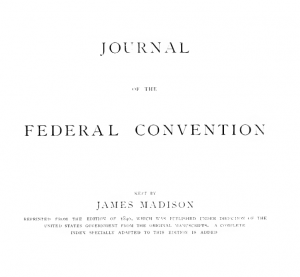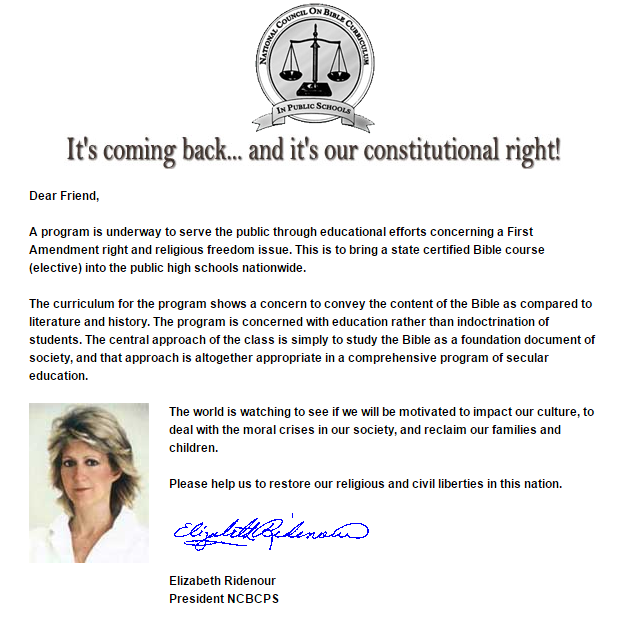Self-styled historian David Barton says it does. In a DVD (also on YouTube) called Constitutional Christian, Barton repeats a familiar claim that the Constitution is full of Bible verses (hat tip RWW). Watch:
[youtube]https://www.youtube.com/watch?v=CuQOw83GqUs[/youtube]
Barton specifically mentions Deuteronomy 17:15 which reads (NASV):
you shall surely set a king over you whom the Lord your God chooses, one from among your countrymen you shall set as king over yourselves; you may not put a foreigner over yourselves who is not your countryman.
The relevant clause of Article II of the Constitution reads:
No person except a natural born citizen, or a citizen of the United States, at the time of the adoption of this Constitution, shall be eligible to the office of President; neither shall any person be eligible to that office who shall not have attained to the age of thirty five years, and been fourteen Years a resident within the United States.
First, it is important to see critical differences between Deuteronomy and this clause of Article II. The major difference is that God chose the king of Israel while the Constitution sets eligibility requirements for an elected official who is not a king. Another important difference is that Article II contains an exception to the citizenship requirement. Foreign born people who were citizens at the time the Constitution was adopted were eligible. Thus, a foreigner could be eligible, at least until that generation died off.
Barton’s essential claim is that the framers included the citizenship requirement because it is in the Bible. However, Barton offers no evidence that the framers of the Constitution consulted the Bible or even referred to the Bible in establishing this clause. Happily, we have a reasonably detailed record of the proceedings of the Constitutional Convention. The delegates discussed citizenship requirements in depth but didn’t appeal to the Bible. Barton’s claim fails on two counts: Article II is not Deuteronomy 17:15 and the framers didn’t refer to the Bible when crafting eligibility requirements for federal office.
What did the delegates to the Constitutional Convention talk about?
In July and August of 1787*, the delegates debated the citizenship requirements for legislators and president. Some of the framers (e.g., Madison, Franklin) wanted to allow foreigners to hold office, while others (e.g. Morris, Pinckney) wanted tighter restrictions. Several votes were taken on the number of years foreign born people must live in the U.S. before being eligible to serve in the House, Senate and as president. The framers were not unified and certainly did not rally around a set of biblical principles.
An excerpt will illustrate the debate:
Article 5, Sect. 3, was then taken up.
Mr. Gouverneur Morris moved to insert fourteen instead of four years citizenship, as a qualification for Senators; urging the danger of admitting strangers into our public councils.
Mr. Pinckney seconded him.
Mr. Ellsworth was opposed to the motion, as discouraging meritorious aliens from emigrating to this country.
Mr. Pinckney. As the Senate is to have the power of making treaties and managing our foreign affairs, there is peculiar danger and impropriety in opening its door to those who have foreign attachments. He quoted the jealousy of the Athenians on this subject, who made it death for any stranger to intrude his voice into their legislative proceedings.
Col. Mason highly approved of the policy of the motion. Were it not that many, not natives of this country, had acquired great credit during the Revolution, he should be for restraining the eligibility into the Senate, to natives.
Mr. Madison was not averse to some restrictions on this subject, but could never agree to the proposed amendment. He thought any restriction, however, in the Constitution unnecessary and improper ; —unnecessary, because the National Legislature is to have the right of regulating naturalization, and can by virtue thereof fix different periods of residence, as conditions of enjoying different privileges of citizenship ;—improper, because it will give a tincture of illiberality to the Constitution ; because it will put out of the power of the national Legislature, even by special acts of naturalization, to confer the full rank of citizens on meritorious strangers ; and because it will discourage the most desirable class of people from emigrating to the United States. Should the proposed Constitution have the intended effect of giving stability and reputation to our Governments, great numbers of respectable Europeans, men who loved liberty, and wished to partake its blessings, will be ready to transfer their fortunes hither. All such would feel the mortification of being marked with suspicious incapacitations, though they should not covet the public honors. He was not apprehensive that any dangerous number of strangers would be appointed by the State Legislatures, if they were left at liberty to do so ; nor that foreign powers would make use of strangers, as instruments for their purposes. Their bribes would be expended on men whose circumstances would rather stifle than excite jealousy and watchfulness in the public.
Mr. Butler was decidedly opposed to the admission of foreigners without a long residence in the country. They bring with them, not only attachments to other countries, but ideas of government so distinct from ours, that in every point of view they are dangerous. He acknowledged that if he himself had been called into public life within a short time after his coming to America, his foreign habits, opinions, and attachments, would have rendered him an improper agent in public affairs. He mentioned the great strictness observed in Great Britain on this subject.
Doctor Franklin was not against a reasonable time, but should be very sorry to see any thing like illiberality inserted in the Constitution. The people in Europe are friendly to this country. Even in the country with which we have been lately at war, we have now, and had during the war, a great many friends, not only among the people at large, but in both Houses of Parliament. In every other country in Europe, all the people are our friends. We found in the course of the Revolution, that many strangers served us faithfully, and that many natives took part against their country. When foreigners after looking about for some other country in which they can obtain more happiness, give a preference to ours, it is a proof of attachment which ought to excite our confidence and affection.
Concerning the office of Senator, the delegates argued over how long a foreign born citizen had to be a citizen in order to be eligible. Rather than the Bible, Morris appealed to fear and national loyalty while his colleague Pinckney appealed to Greek political law. Only citizens could vote in Athens and Pinckney cited their law as support. South Carolina delegate Pierce Butler also cited the example of Great Britain as support for lengthy citizenship requirements. Later in the debate, Morris made a strong appeal to nationalism, saying
As to those philosophical gentlemen, those citizens of the world, as they called themselves, he owned, he did not wish to see any of them in our public councils. He would not trust them. The men who can shake off their attachments to their own country, can never love any other. These attachments are the wholesome prejudices which uphold all governments. (p. 489)
Mason and Ellsworth countered that many good people had served the nation during the Revolution and should be allowed to continue to serve. Madison and Franklin viewed citizenship requirements for foreign born citizens as illiberal and too restrictive. Not one delegate cited Israel, Deuteronomy, or the Bible as a source or support for their position. Eventually, Morris’ argument won out and the delegates settled on a nine year citizenship requirement to be eligible to be a Senator.
The next day, the delegates again took up the debate, this time over citizenship requirements for the House of Representatives. Again, the debate centered on merits of being open and liberal versus the perception of danger from foreign meddling. Eventually, as with the requirements for president, a compromise was suggested which allowed citizens at the time the Constitution was adopted to serve without having to meet the lengthy citizenship qualification.
The requirement that the president be a “natural born citizen” or a citizen at the time of the adoption of the Constitution was passed on September 7 without debate as recorded by James Madison. The delegates also decided that the chief executive must have been a citizen for at least 14 years. Again, Madison recorded no debate over the matter. For sure, there was no recorded reference to the Bible, Deuteronomy, or Israel.
For Barton’s argument to have any weight, he would need to produce evidence. I am open to any primary source evidence he might bring. However, what I have seen so far provides evidence against his claim. The Constitution doesn’t quote the Bible verbatim no matter how much he wishes it did.
*July 26 (page 434), August 8 (p. 472), August 9 (p. 482), August 10 (p. 497), and August 13 (p. 506)
 June 8, 1787
June 8, 1787